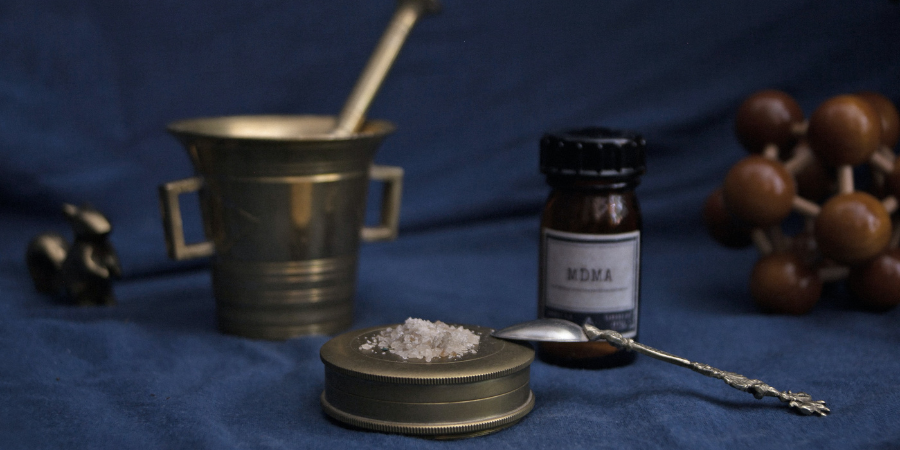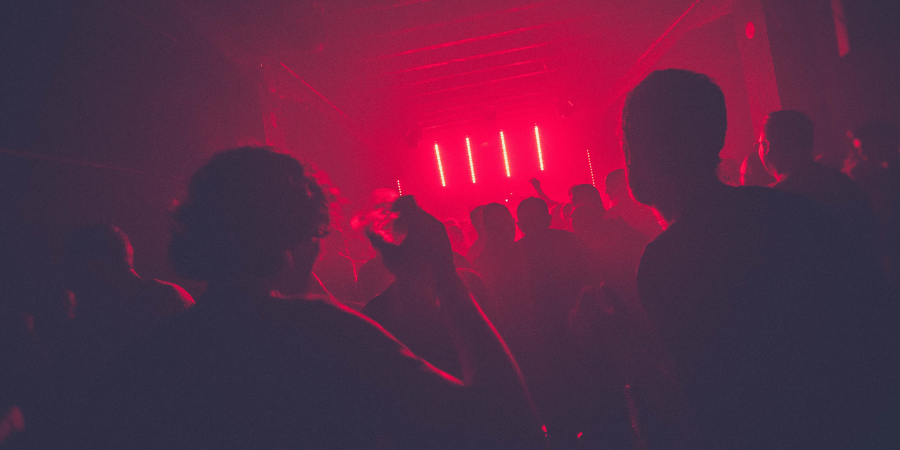
Written by:

Medically Reviewed by:
Last Updated:
March 5th, 2025
Ecstasy Addiction | Definition, Symptoms and Effects
Despite being known by many people as a “party drug”, ecstasy addiction and abuse is a serious problem that can have devastating consequences for both you and your loved ones. When you are caught up in a cycle of addiction, it can seem like there is no way out of it. But this is not the case! At Primrose Lodge, we have an ecstasy rehab programme that has helped many people overcome their addiction and start a whole new life.
On this page, we will explain the adverse effects of ecstasy abuse, the different routes to ecstasy addiction and how to start your road to recovery.
What is ecstasy?
Ecstasy is the street name for a range of synthetic drugs, also known as MDMA (methylenedioxymethamphetamine). MDMA can be consumed in its pure form as a crystalline powder (commonly known as “Molly” or “Mandy”) which is extremely potent or in pill form. These are usually made in illegal laboratories and can be swallowed or crushed up and snorted. Ecstasy pills vary in strength and are often mixed with other chemicals, so it is hard to know how strong a dose you are taking or even what is actually inside the pills.
Ecstasy is taken mainly for the short-term effects it induces, including increased alertness, euphoria, hallucinations, increased energy and sociability, and increased sexual arousal. These effects make ecstasy very common in party environments, such as nightclubs.
How does ecstasy work?
When you take ecstasy, the chemical MDMA is released into your brain, hours where it binds to serotonin receptors. Serotonin is a neurotransmitter that plays a role in mood, sleep and appetite. The binding of MDMA to serotonin receptors causes an increased release of serotonin which leads to the feeling of euphoria or “high” associated with taking ecstasy.
Ecstasy also increases the levels of dopamine and noradrenaline in your system. These chemicals are responsible for increasing energy levels and feelings of pleasure. They enable people to dance for long periods of time without feeling tired and make them feel more outgoing, chatty and “loved up”.
However, ecstasy is also associated with several negative effects, some of which may be felt even whilst you’re under the influence of the drug. These negative effects include impaired judgement, anxiety, confusion, paranoia and memory loss.
The effects of ecstasy can last for between three to six hours, but the after-effects or “comedown” can leave people feeling tired, anxious, depressed and even suicidal for several days afterwards. This is due to a depletion of serotonin levels in the brain.
Why is ecstasy addictive?
Addiction is a complex condition characterised by compulsive drug-seeking and use, despite harmful consequences. Ecstasy addiction can cause changes in your brain, physical and mental health conditions and problems in your social life, work or education.
There are two main routes to ecstasy addiction: through social use or using it as a coping mechanism:
Social use
Ecstasy is often taken in party environments such as nightclubs, festivals or house parties. It is used as a way to socialise, dance and feel more outgoing. However, what starts off as social use can quickly turn into something more serious. As you begin to take more ecstasy, you can develop a tolerance to it so you need to increase the dosage to get the same high. This can then lead to an ecstasy dependence where you feel like you need to take it regularly to function normally.
Coping mechanism
For some people, ecstasy can become a way of coping with difficult emotions or life events such as anxiety, depression, stress or trauma. This is because the short-term effects of the drug can make these problems seem less daunting. However, using ecstasy as a coping mechanism can actually exacerbate these conditions and even trigger mental health problems such as psychosis. As with social use, ecstasy abuse can quickly lead to tolerance and dependence, where you experience unpleasant symptoms if you stop taking the drug.
Ultimately, both of these routes can result in the development of ecstasy addiction. Not everyone who takes ecstasy will develop an addiction so what makes ecstasy addictive? Some of the factors that increase the risk include:
- A family history of addiction
- Mental health problems such as anxiety, depression or PTSD
- Taking ecstasy regularly and excessively
- Using other drugs alongside ecstasy
If you or somebody you know is worried about ecstasy addiction, get in touch with Primrose Lodge today and we can help you take the first steps towards recovery.
What are the adverse ecstasy addiction effects?
As with any drug, there are short-term and long-term risks associated with taking ecstasy. These risks increase if you take larger doses or use it regularly. The first risk to be aware of is that taking ecstasy can be potentially lethal, even if it’s your first time. This is because you can never be completely sure of the strength or purity of the drug or how you will react to it. Death often occurs due to extreme overheating or dehydration, especially if people are dancing for long periods of time in hot environments such as nightclubs.
Health risks of ecstasy include:
- Mental health problems
- Chronic insomnia
- Increased chance of contracting an STI due to risky sexual behaviour
- Permanent damage to the brain, kidneys and liver due to toxicity
- Impaired judgement and associated risks
- Haemorrhaging
- Ataxia
- Cardiac collapse
In addition to these health risks, there can also be many negative ecstasy addiction effects on your social life, family relationships, work or education. For example, you may start to miss work or school due to your drug use. You may also start to distance yourself from friends and family as your addiction takes over your life.
UK ecstasy addiction statistics
The UK has a long history with ecstasy which began in the late 1980s and early 1990s when the drug first became popular in nightclubs. Home Office Statistics show that ecstasy is now the second most popular drug amongst young people, with 4.5% of sixteen to twenty-four-year-olds using the drug. Furthermore, it’s the third most popular drug amongst sixteen to forty-nine-year-olds, with 1.5% of this age group reporting ecstasy abuse. At Primrose Lodge, we treat many young people for ecstasy addiction so we see the enormous damage this drug can do to people’s lives, livelihoods and loved ones.
Am I addicted to ecstasy?
Ecstasy addiction can be very cunning and dishonest and will try to hide itself from you and your loved ones. This enables it to distance you from your support system so that it can isolate you and convince you that there is no issue.
Here are some questions to ask yourself which could indicate ecstasy addiction symptoms:
- Do I take ecstasy regularly?
- Do I feel like I need to take it to function normally?
- Have my family or friends raised concerns about my use?
- Has my drug use led to financial, social or legal problems?
- Am I neglecting my personal responsibilities such as work or school?
- Do I continue to use ecstasy despite the negative consequences?
If you recognise any of these ecstasy addiction signs in yourself, it’s important to reach out for professional help as soon as possible. Get in touch with us today and we can explain how we can help you overcome your addiction.
Advice for loved ones
If you’re worried that a friend or family member may be taking ecstasy, look out for changes in their behaviour such as becoming withdrawn, secretive or moody. You may also notice changes in their sleeping patterns, appetite or weight.
If you have spotted any ecstasy addiction signs in a friend or family member, it’s important to have a conversation with them about your concerns. This can be a difficult conversation, but it’s important to approach it in a non-judgemental and supportive way. Remember that these signs could be indications of other problems so it’s important to be cautious when approaching the subject.
If your loved one is addicted to ecstasy, it is very important not to enable their addiction by continuing to support them financially or emotionally. This will only help fuel their ecstasy use and make it more difficult to help them overcome their addiction.
If you’re struggling to address a loved one’s ecstasy addiction or abuse, we can help. Get in touch with us today and we’ll provide you with the support and advice you need.
Five important facts about ecstasy
- Ecstasy is classified as a Class A drug. This means if you are caught in possession of ecstasy, the maximum sentence is seven years plus a fine, while supplying the drug carries a harsher penalty of life imprisonment and a fine.
- Ecstasy is often cut with other substances such as amphetamines, caffeine and ketamine. This makes it difficult to know what you’re taking and increases the risk of adverse effects.
- Taking ecstasy with alcohol can increase the risk of dehydration and heatstroke.
- Street names for ecstasy include beans, biscuits, hug drug and XTC.
- Ecstasy is sometimes used as a date rape drug because it can cause memory problems and make people more compliant.
Overcoming ecstasy addiction
Ecstasy addiction is a complex condition so it requires a comprehensive treatment programme. At Primrose Lodge, we offer a residential rehab programme which includes a detoxification process, a range of therapies and supplementary activities and a full aftercare programme.
Myths about ecstasy addiction
Ecstasy addiction is a choice and a person can give up any time they want
False! Ecstasy addiction is a chronic and multi-faceted condition which usually requires professional treatment.
I can’t be addicted to ecstasy because I only take it occasionally
False! You can develop an addiction to ecstasy after only taking the drug a few times, even just once.
Pure MDMA is safe because it doesn’t include any other substances like ecstasy pills often do
False! Taking any form of MDMA comes with risks as it’s a powerful psychoactive drug.








